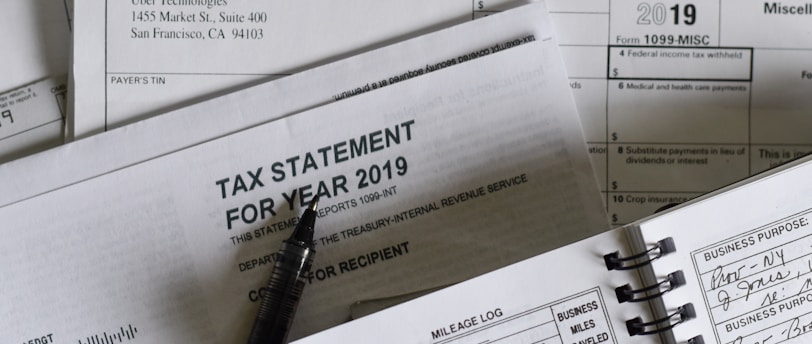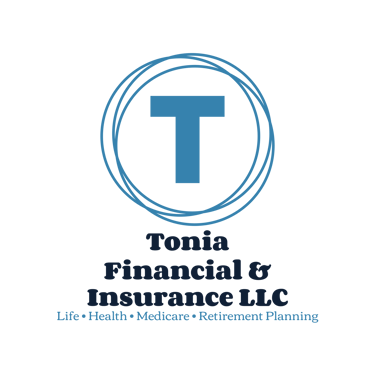Stress-Free Tax Preparation Tips & Strategies
Discover how to simplify tax time with our comprehensive guide on tax preparation. Learn to maximize deductions, stay organized, and implement smart tax strategies to save money and file confidently. Prepare all year round to avoid last-minute chaos!
TAX TIPS
Tonia Perry
2/1/20254 min read


How to Prepare for Tax Time All Year Long
Tax season doesn’t have to be stressful if you stay prepared throughout the year. Whether you’re self-employed, a small business owner, or simply want to avoid last-minute scrambling, taking a proactive approach can make filing your taxes easier and even save you money.
In this guide, we’ll cover key strategies to stay tax-ready all year long, from organizing your finances to maximizing deductions.
1. Keep Track of Your Income & Expenses Year-Round
The biggest tax mistakes often come from disorganized records. Keeping detailed, accurate records will help you:
✅ Avoid missing deductions and credits
✅ Report your income correctly
✅ Prevent IRS audits
How to Track Income & Expenses Efficiently:
Use Accounting Software: QuickBooks, FreshBooks, and Wave help automate recordkeeping.
Open a Separate Bank Account: If you’re self-employed or own a business, keeping personal and business finances separate makes tax time easier.
Save Digital Copies of Receipts: Apps like Expensify or Evernote allow you to scan and store receipts so you don’t lose them.
Maintain a Spreadsheet: If you prefer a simple method, an Excel or Google Sheets file can track income, expenses, and estimated taxes.
➡ Pro Tip: Set aside time monthly to review your records instead of waiting until tax season.
2. Adjust Your Tax Withholdings or Estimated Payments
If you consistently owe taxes or get large refunds, you may need to adjust your withholdings or estimated payments.
For W-2 Employees:
Review your Form W-4 and update your withholdings with your employer if needed.
Use the IRS Tax Withholding Estimator (irs.gov) to make sure you’re on track.
For Self-Employed or 1099 Workers:
Make quarterly estimated tax payments to avoid a big bill at the end of the year.
Use Form 1040-ES to estimate your payments based on your income.
Set aside 20-30% of your income for taxes in a separate savings account.
➡ Pro Tip: If your income fluctuates, base your estimated tax payments on your most profitable months to stay ahead.
3. Organize Your Tax Documents & Forms
Missing documents can delay your tax filing and lead to mistakes. Set up a tax folder (physical or digital) where you store important paperwork, such as:
📂 Income Forms: W-2s, 1099s, bank statements, rental income records
📂 Expense Records: Receipts for business expenses, medical bills, childcare costs
📂 Investment Documents: 1099-DIV for dividends, 1099-B for capital gains
📂 Deduction Documents: Mortgage interest (Form 1098), student loan interest, retirement contributions
➡ Pro Tip: Create a checklist of tax forms you expect to receive and confirm you have them before filing.
4. Maximize Deductions & Credits
Deductions and tax credits can significantly reduce your tax bill, but many people miss out because they don’t track eligible expenses throughout the year.
Common Tax Deductions:
Business Expenses: Office supplies, software, travel, home office deduction
Health Costs: Out-of-pocket medical expenses over 7.5% of your income
Education Expenses: Tuition, books, student loan interest
Retirement Contributions: 401(k), IRA, or HSA contributions
Tax Credits to Watch For:
Earned Income Tax Credit (EITC) – For low- to moderate-income earners
Child Tax Credit – Up to $2,000 per child
Saver’s Credit – If you contribute to retirement savings and qualify based on income
➡ Pro Tip: Keep a running list of deductible expenses in a notebook or an app like Mint or YNAB.
5. Plan for Life Changes That Impact Taxes
Major life events can change your tax situation, and planning ahead can help you adjust:
💍 Marriage or Divorce: Update your tax filing status (Married Filing Jointly vs. Separately).
👶 Having a Baby: You may qualify for the Child Tax Credit and Dependent Care Credit.
🏡 Buying a Home: Mortgage interest and property taxes are deductible.
🎓 Going Back to School: Check for education credits like the Lifetime Learning Credit.
➡ Pro Tip: If you experience a major life change, meet with a tax professional to see how it affects your tax situation.
6. Use Tax-Advantaged Accounts to Lower Your Tax Bill
Smart tax planning isn’t just about filing correctly—it’s about reducing taxable income throughout the year.
Tax-Advantaged Accounts to Consider:
401(k) or IRA Contributions: Reduce taxable income while saving for retirement.
Health Savings Account (HSA): Tax-free savings for medical expenses.
Flexible Spending Accounts (FSA): Use pre-tax dollars for medical or dependent care.
➡ Pro Tip: Max out your retirement contributions before the deadline to lower your tax bill.
7. Keep Up with Tax Law Changes
Tax laws change frequently, and staying informed can help you take advantage of new deductions and credits.
Ways to Stay Updated:
📌 Follow IRS updates at irs.gov
📌 Subscribe to tax newsletters or blogs
📌 Consult a tax professional for personalized advice
➡ Pro Tip: If you’re a business owner, stay informed about self-employment tax deductions and any new laws affecting your industry.
8. Don’t Wait Until the Last Minute!
One of the biggest tax mistakes is waiting until the deadline to gather documents and file. To avoid stress:
✅ Start organizing tax documents in January as you receive them.
✅ Set calendar reminders for important tax deadlines.
✅ Schedule a tax consultation early if you need help.
➡ Pro Tip: If you can’t file on time, request a tax extension using Form 4868 to avoid late-filing penalties.
Final Thoughts: Stay Ahead of Tax Season
Tax season doesn’t have to be overwhelming if you take small steps throughout the year to stay prepared. By tracking income, keeping organized records, and maximizing deductions, you can reduce your stress and your tax bill.
💡 Need help getting tax-ready? I offer personalized tax planning to keep you ahead of the game! Message me for a consultation.
#TaxTips #FinancialFreedom #TaxPlanning #SmallBusinessTaxes #TaxSeason #SelfEmployedTaxes

EMAIL: Strive.tonia@gmail.com
PHONE:(216)800-7303
© 2025. All rights reserved.
We do not offer every plan available in your area. Currently, we represent 9 organizations which offer 80 products in your area. Please contact Medicare.gov, 1-800-MEDICARE, or your local State Health Insurance Assistance Program (SHIP) to get information on all of your options. This is a proprietary website and is not associated, endorsed or authorized by the Social Security Administration, the Department of Health and Human Services or the Center for Medicare and Medicaid Services. This site contains decision-support content and information about Medicare, services related to Medicare and services for people with Medicare. If you would like to find more information about the Medicare program please visit the Official U.S. Government Site for People with Medicare located at http://www.medicare.gov
Independent Insurance Agent | Final Expense Insurance Ohio | Medicare Advantage Plans Cleveland | Life Insurance for Children | Medigap Plans PA | Insurance Advisor for Seniors | Community Insurance Help
